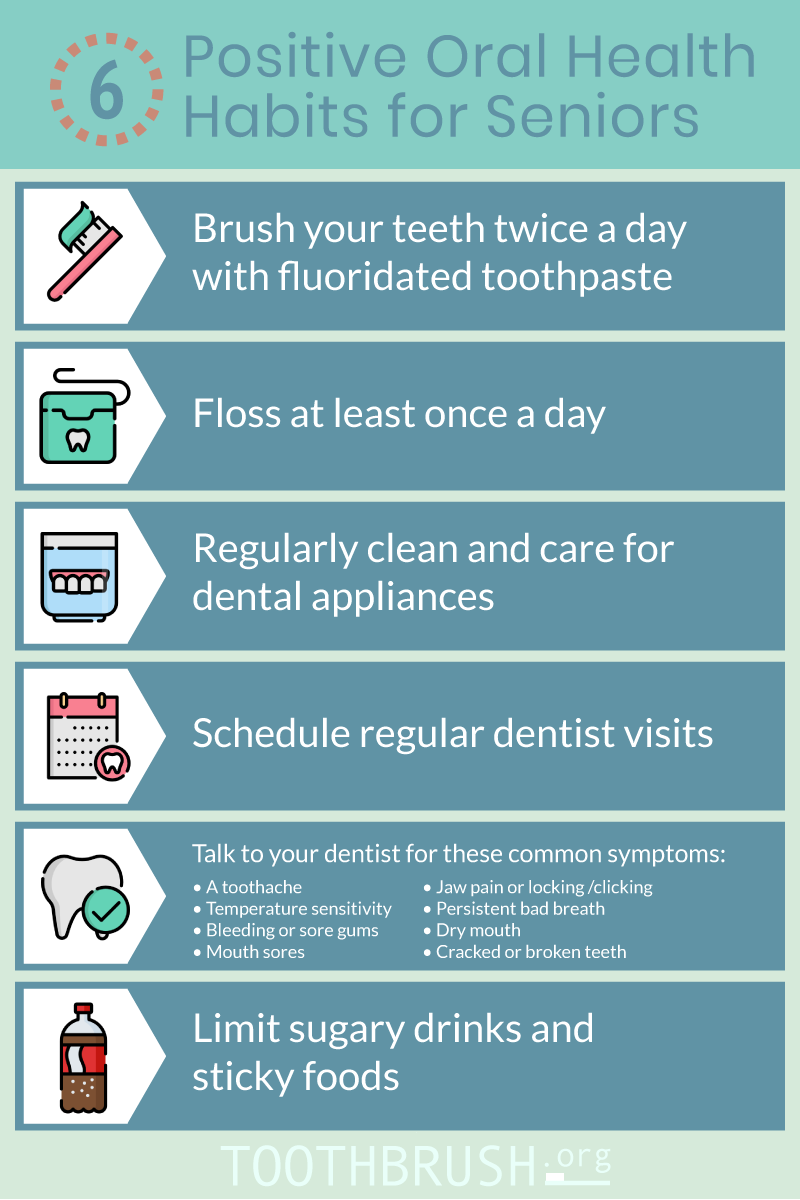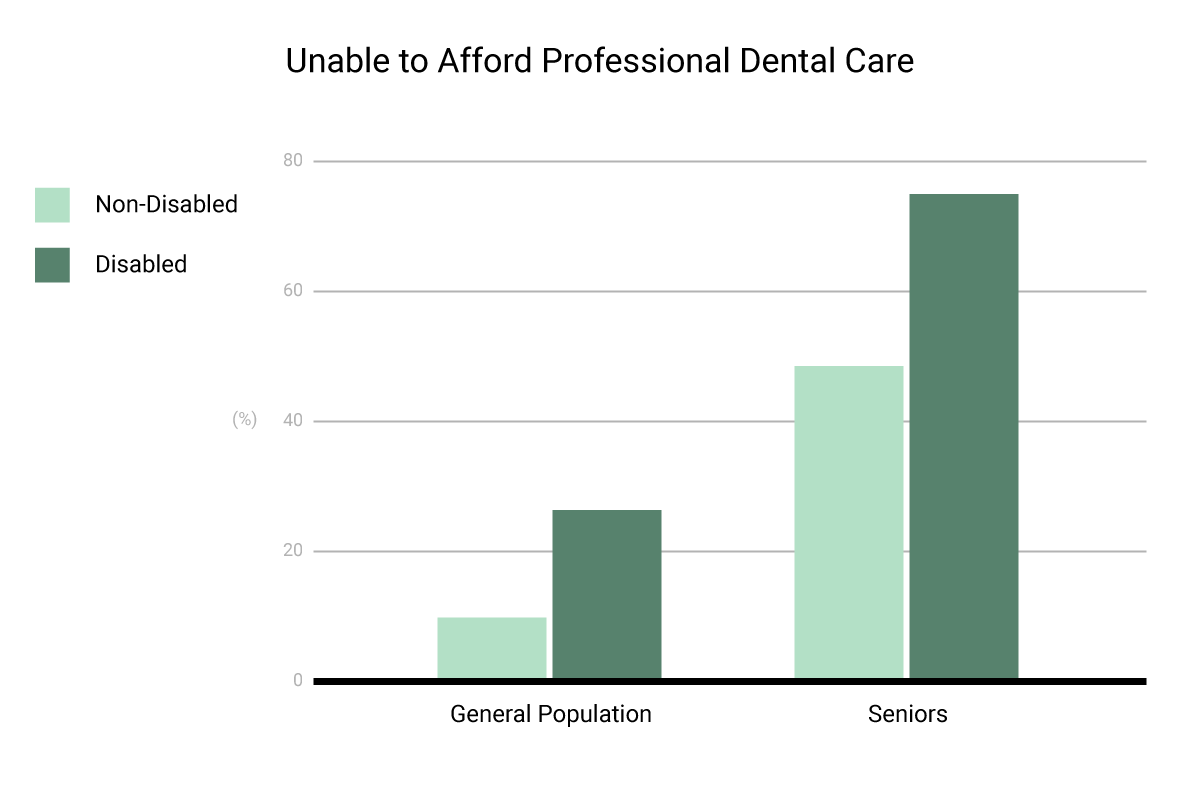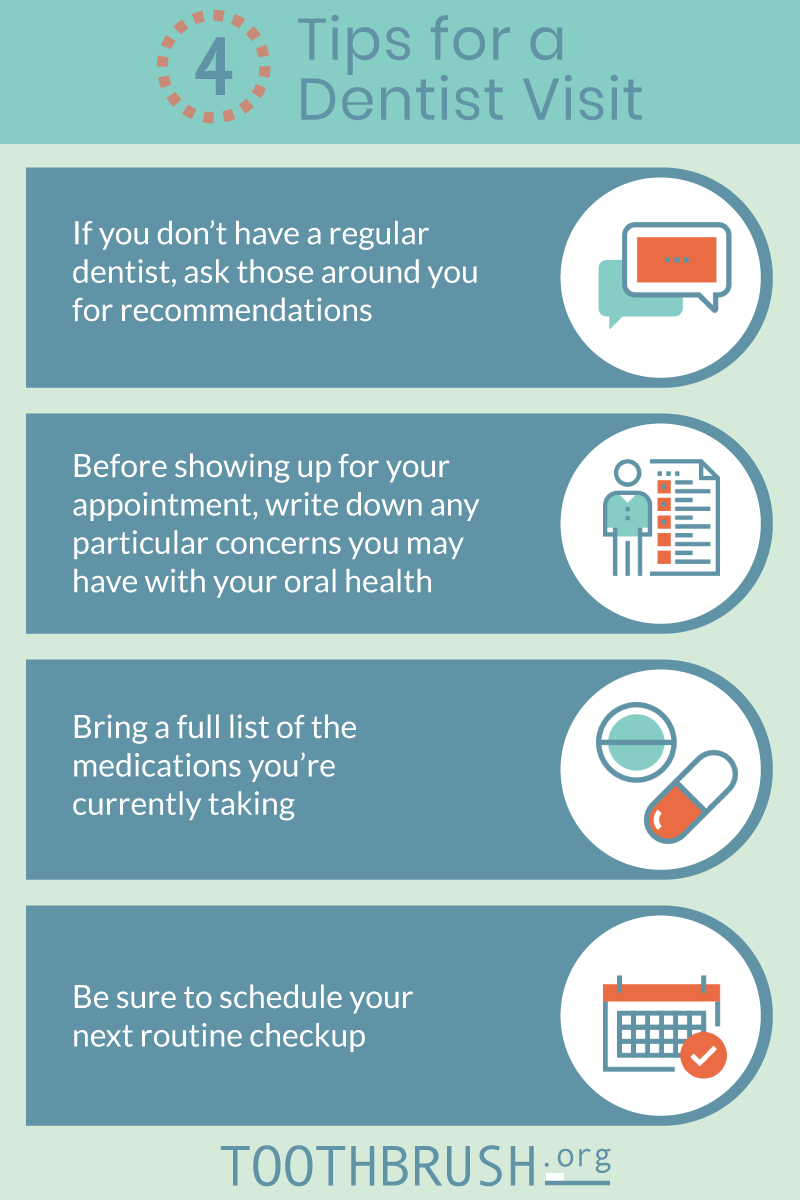Last Updated: April 11, 2018
For seniors, oral health is an essential, yet often overlooked aspect of living a healthy lifestyle. Maintaining good oral hygiene for older adults is critical in not only preventing oral health issues, but also potentially serious chronic illnesses, including heart disease, diabetes, and stroke.
It’s important for seniors to maintain both good oral hygiene and routine dental check-ups because older adults are at a higher risk for oral-based problems than younger adults. Seniors have an increased rate of tooth loss and oral infections. For example, the rate of periodontal disease (a serious gum infection that can cause damage to the gum and destroy the jawbone) is a staggering 70.1% in adults aged 65 and older, compared to just 24.4% in adults aged 30-34. Without treatment, periodontal disease and tooth decay can lead to increased infection, pain, tooth loss, and other side-effects.
According to the American Dental Association (ADA), while 76% of seniors said they plan to see a dentist within the next year, only 42% had gone within the previous year. For seniors in the low-income bracket, that number was only 23%. For many older adults, cost can be a roadblock to regular dental exams. Dental benefits often vanish after retirement, and without finding an insurance replacement, even routine check-ups can be unaffordable for some.
We created this guide to help seniors overcome the additional challenges they face in maintaining good oral health. In addition to discussing the overall importance of oral health, we will explain how to take care of your teeth, what to expect during your next dental visit, and how to obtain financial assistance.
Table of Contents
- The Link Between Oral Health and Overall Health
The Link Between Oral Health and Overall Health
Maintaining healthy teeth and gums is essential in preventing oral-based health issues, ranging from tooth loss and gum disease to increased infections and difficulty eating.
Tooth Decay and Consequences of Poor Oral Health
For many older adults, tooth decay is a sign of a larger oral health problem that needs to be addressed. According to the National Institute of Health (NIH), 93% of adults over 65 years old who still have permanent teeth have had some form of tooth decay. While decay itself is common among seniors, it can result in an abscess, tooth loss, bone loss, increased pain, and chronic infection, especially if left untreated by a dental professional.
Oral Health and Serious Diseases
The state of your oral health goes well beyond your gums and teeth. Poor oral hygiene can lead to a variety of potentially life-threatening illnesses, including:
- Cardiovascular Disease (CVD)
- Stroke
- Diabetes
- Respiratory diseases
- Kidney diseases
- Peripheral Vascular Disease (PVD)
- Dementia
- Aspiration Pneumonia
- Stomach ulcers
- Oral cancers
- Obesity
A 2015 study found that adults with 10 or fewer original permanent teeth were seven times more likely to die of coronary disease than someone with 25 or more permanent teeth. Severe periodontal disease has also been linked to diabetes, as well as an increased chance of experiencing a stroke.
Poor oral health has much greater implications than the immediate state of your teeth and gums. It can often be an indicator that you’re at risk for one or several of the diseases listed above. Regularly cleaning your teeth, as well as a routinely visiting a dentist can help maintain healthy teeth and gums and prevent many of the illnesses that can be caused by poor dental hygiene.
Dental Hygiene for Seniors
It’s not too late to start taking better care of your teeth and gums. The first step in preventing and possibly reversing damage done by poor oral hygiene is to establish optimal oral health habits.
Positive Oral Health Habits

Brush your teeth twice a day with fluoridated toothpaste.
Plaque, which has been linked as a contributing factor to both gum disease and heart disease, can build up quickly on teeth that haven’t been properly cleaned. The first step to establishing a healthy oral regimen is to brush your teeth at least twice daily with a fluoridated toothpaste. Additionally, gently brushing your gums and tongue during every brush can reduce the buildup of plaque and bacteria in the mouth.
For those with more severe plaque buildup, an electric toothbrush may help you clean your teeth more effectively. Regardless of whether you use a manual or electric toothbrush, you should replace the brush head every 3 to 4 months to maximize the effectiveness of your brushing.
Dev Note: Link to electric toothbrush guide, indicated by an outline above
Floss at least once a day.
Another essential part of maintaining oral health is by flossing at least once a day. Flossing helps to remove the difficult to reach plaque that can accumulate between your teeth. In addition to traditional floss, a water floss device can be effective in removing excess food and plaque that toothbrushes can’t reach.
Regularly clean and care for dental appliances.
For those with dental appliances such as dentures, dental implants, crowns, and bridges, it’s just as important to practice hygienic habits. Dentures must be brushed at least daily and should be removed and rinsed after eating to reduce bacterial buildup. Dental implants are a more permanent solution but require the same attention as natural teeth. Crowns and bridges will also only last as long you’re maintaining the health of your teeth.
Dentist Visits
While healthy habits at home are important, it’s also vital to regularly visit a dentist for checkups and routine cleanings. Not only will this help you keep your teeth clean, but your dentist will also be able to monitor for more serious issues including periodontal disease and tooth decay.
If you’re experiencing any sudden pain, changes in your oral health, or even sudden changes in taste, don’t wait for your next scheduled dental appointment to act. If you’re at risk for a serious condition like oral cancer or gum disease, catching it early increases the likelihood of successful treatment. Call your dentist office (or find a dentist if you don’t have one) and explain your symptoms as soon as possible.
Of the 10 most common dental symptoms, eight can be warning signs of oral health problems according to the ADA:
- A toothache
- Sensitivity to hot, cold, or sweet beverages or food
- Bleeding or sore gums
- Mouth sores
- Persistent bad breath
- Jaw pain or popping/clicking in the jaw
- Dry mouth
- Cracked or broken teeth
Other Positive Habits
Aside from proactively improving your dental hygiene routine and visiting the dentist for routine checkups, there are other positive habits you can take on to improve your oral health. Drinking fluoridated water regularly is a simple way to protect teeth against decay at any age. It’s also recommended that you limit foods and beverages that are high in sugar or have a high acidity, including coffee.
According to the Center for Disease Control (CDC), avoiding all forms of tobacco is also important in maintaining dental health. The CDC states that tobacco in any form increases the risk for periodontal disease, oral and throat cancers, and oral fungal infection. Compared to non-smokers, smokers have seven times the risk of developing periodontal disease. Alcohol is also a factor in oral and throat cancers, especially when paired with tobacco, and should be kept to a minimum.
Oral Health for those with Dry Mouth
Dry mouth, or xerostomia, is the condition of not producing enough saliva to keep the mouth moist. Symptoms include a sticky, dry feeling in the mouth, trouble chewing and swallowing, and a dry, rough tongue. According to the ADA, over 50% of seniors aged 65 and older have experienced dry mouth, with 11% having experienced it very often. While dry mouth is not a natural symptom of aging, it can be caused by medication that older adults are more likely to take, as well as diabetes, chemotherapy, and nerve damage.
Dry mouth can increase the likelihood of tooth decay and bacterial infection since saliva helps to limit those problems. It’s important for anyone living with xerostomia to maintain a healthy oral routine to prevent tooth decay and infection. Brushing your teeth at least twice a day, flossing regularly, and avoiding sugary or sticky foods can reduce the risks associated with dry mouth. Drinking plenty of water, especially with meals, helps to eliminate the sensation of dry mouth. Additionally, the NIH recommends that those with dry mouth visit the dentist for a checkup at least twice a year.
Dental Hygiene for Seniors with Physical Disabilities
People with disabilities are less likely than those without disabilities to have visited a dentist within the past year and more likely to have few or no teeth. Only 42% of adults over 65 visited a dentist within the past year. Seniors who live with physical disabilities are especially at risk for poor oral health and may require special accommodations to receive the oral hygiene they require.
According to the CDC, living with a physical disability can increase the risk of poor oral health. Common physical disabilities amongst older adults including various types of arthritis, such as rheumatoid and osteoarthritis, as well as osteoporosis. These physical disabilities can hinder basic movements, making it difficult to complete basic oral health tasks like brushing and flossing teeth. Those with mobility issues may find that an electric toothbrush is easier to use than a traditional toothbrush. Other solutions include modifying a manual toothbrush handle with a bicycle grip or velcro straps.
Barriers to Professional Healthcare
A national study found that people with physical disabilities have a 57% higher risk of having an unmet dental need. There are many barriers that can hinder someone living with a physical disability from receiving the professional oral health care they need, including the inability to transfer to a dental chair, trouble with filling out forms, and the unwillingness or inability of some dental offices to accept older patients with physical disabilities. Those with sensory disabilities, including macular degeneration and hearing loss, may have difficulty in communicating with their dental professional.
Another hindrance to elderly people with physical disabilities receiving dental care is cost. 26.6% of people of any age with any disability did not receive essential dental care due to expenses, compared to only 10.1% for people with no disabilities. According to the ADA, 49% of all seniors listed cost as the main reason for not visiting a dentist in the past 12 months. For older adults in low-income households, that number elevated to 69%. While cost is the chief roadblock for all senior citizens to get the dental care they need, seniors with physical disabilities find it especially difficult to afford adequate dental care.

Importance of Maintaining Oral Health
While it may seem like oral health upkeep should take a backseat to caring for a severe physical disability, older adults should strive to maintain good oral health to help prevent the onset of serious chronic diseases. For example, bacteria that builds up as a result of poor oral health maintenance can be inhaled into the lungs and potentially cause pneumonia, which can be especially dangerous for bedridden seniors.
Older adults who have difficulty with maintaining good oral health or visiting the dentist, or those who care for them, should take steps to ensure that oral hygiene isn’t neglected.
What to Expect From a Dentist Visit
While 76% of seniors say they plan to visit the dentist in the next year, only 42% of all seniors actually visited the dentist within the last year. As we established in the sections above, routine dental checkups are a critical aspect of maintaining good oral health. Failing to regularly receive dental treatment can lead to chronic illnesses including Cardiovascular Disease (CVD), stroke, diabetes, oral cancers, pneumonia, and other serious diseases.
Preparing For Your Dental Visit
If you don’t have a regular dentist, the best place to start is to ask those around you for recommendations. Your family doctor, friends, or family members may be able to provide a recommendation. After you find a good dentist, call to schedule an appointment as soon as possible because some offices may not have room to schedule an appointment for several months.
Before showing up for your appointment, write down any particular concerns you may have with your oral health. It’s always better to be prepared ahead of time with any questions you may have.
Many dental offices will send you a medical history form before your appointment. Be sure to list any past medical issues, surgeries, or allergies. It’s also recommended to bring a full list of the medications you’re currently taking, including prescription and over-the-counter drugs, as well as vitamins and supplements.
During the Exam
If it’s your first visit to this dentist, it’s likely that he or she will ask questions about your dental history, as well as give you a routine dental examination. Some common questions should include:
- The date of your last dental exam
- If you’ve noticed any changes recently in your teeth or gums
- If you experience any pain or discomfort
- If you have any difficulty swallowing or chewing
If no serious dental issues are found, the examination should be a simple and routine checkup. Your dentist will likely check your jaw and bite to ensure there are no alignment issues, your cheeks for possible ulcers or infected areas, your teeth and gums for signs of decay or periodontal disease, as well as the tongue and other areas for signs of oral cancer.
After the Exam
Depending on what the dentist found during your examination, you may either simply need to stick to a healthy routine until the next checkup, or you might have a more serious issue to address. Regardless, be completely transparent with your dental professionals and heed the advice they offer after your examination.
Most importantly, be sure to schedule your next routine checkup to ensure that you maintain healthy oral health habits.

Financial Assistance and Dental Insurance for Seniors
Half of seniors with incomes below $35,000 stated that cost was the main reason they do not visit the dentist on a routine basis. With dental insurance benefits often evaporating upon retirement, cost is a prevalent obstacle for older adults in regularly visiting the dentist.
Medicare and Medigap plans
For many people over 65, Medicare is their primary health insurance provider. However, Medicare does not cover most dental care, excluding any emergency procedures that are done in the hospital for those covered by Medicare Part A (hospital insurance). Those with both Medicare plans A and B can add supplemental insurance, or a “Medigap” plan to help cover dental costs.
Medicaid
Medicaid funds dental coverage for eligible seniors with disabilities on a state by state basis. While some states offer comprehensive dental for qualifying adults, the coverage levels vary from state to state with many states limiting coverage to emergency services.
Community Health Centers
The Health Resources and Services Administration (HRSA) manages the Community Health Center Program, which is a network of community-based health providers that serve underprivileged areas. These federally qualified centers provide care, including dental, to people of all ages on a sliding scale basis.
Private Insurance and Dental Savings Plans
Organizations like AARP offer dental coverage to seniors who may need to supplement their current coverage. Discounted plan options like those you can search for at the National Association of Dental Plans are another option for finding dentists with low or no interest financing plans, making it possible to have dental work done without insurance. Alternatively, if you’re unable to afford important dental work, your local dentist may have a financing plan that works for you.
Additional Oral Health Resources for Seniors
For more information on oral health for seniors, visit these resources:

